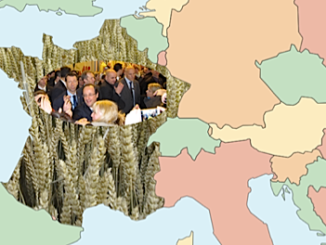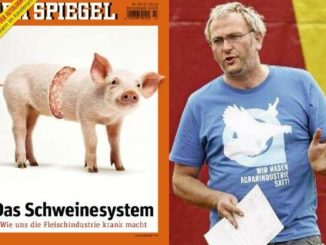
NGOs and governmental institutions have many proposals for approaches to pesticide reduction in Europe. Almost all exclude nutrient management. But if we want to reduce pesticides, that is where we need to start, argues Andrea Beste.
The transition to pesticide-free agriculture is central to a sustainable land and food policy that fulfils the EU’s Farm-to-Fork strategy and can secure sufficient harvests in the long term in view of population growth and climate change. At the same time, it represents an enormous challenge for farmers, who need to completely re-evaluate their production and application practices. This requires a fundamental rethink in European agricultural and chemicals policy. The concept of One Health makes it clear that individual human health should not be considered in isolation, but is closely linked to the health of plants, animals, fellow human beings and the environment.
At European level, the social costs directly attributable to pesticides are twice as high as the direct net profits of the chemical industry. In Germany, for example, agriculture accounts for about 0.7% (approx. €21 billion) of Gross Value Added and employs around 2% of the working population. In contrast, German agriculture causes external costs of at least €90 billion per year. Not a reasonable ratio!
The German National Action Plan for the Sustainable Use of Pesticides (NAP) is currently being revised and a pesticide reduction strategy is under development. As Friends of the Earth Germany wanted to get involved in the discussion at an early stage, the author was commissioned to write a draft for a reduction strategy, which was published in 2023 (in German only).
Below are some of the recommendations.
Science-based practices to promote robust plants
“In recent decades, we have seen a reduction in the resilience of plants and crop yields as well as a deterioration in soil quality. This has led to an exponential need for chemical fertilisers and pesticides,” says Benjamin Fuchs from the Biodiversity Department at the University of Turku, Finland.
Our plant nutrition is outdated and therefore highly suboptimal. It has long been known that one-sided intensive nitrogen fertilisation causes excessive length growth and soft cells and tissue. Cereals bend more quickly and the plants become more susceptible to frost, heat and plant pests. To compensate for this, more and more stalk shorteners, fungicides and insecticides are being used.
However, research also shows that high-quality organic fertilisers contribute to optimal plant growth and yield and greater resistance to water deficits by stimulating the soil microbiome and providing plants with the right nutrient concentrations.
It is now well recognised that different soil organisms work together to recycle nutrients, protect water quality, nourish plants and improve plant resilience to stress factors. They increase crop yields by increasing the availability of plant nutrients, producing growth hormones and combating pathogens and pests. In recent years, research has provided concrete evidence that plants utilise whole molecules directly and therefore do not require a mineralised form of fertilisation. This type of interaction between plant roots and the soil microbiome nourishes plants in a healthier and more balanced way than readily soluble fertilisers, which have been shown to disrupt the microbiome, particularly mycorrhizal fungi. Higher disease resistance has been demonstrated on organically farmed land.
In addition, the choice of species and varieties is of considerable importance for preventive plant protection. Since the 1950s, most breeding work has been completely focused on the framework conditions of conventional agriculture with its high energy and resource input. For a long time, resistance and resistance to diseases hardly played a role. Standardised, high-yielding (hybrid) seed is produced that is neither adapted to the location nor resistant and cannot cope with low inputs of resources. This leads to high-yielding but weak plants and, as a result, an ever-increasing use of pesticides.
Resistance to certain pests is not the only decisive factor when choosing a variety. Much more important is a generally low susceptibility to pathogens. (Note that this cannot be achieved with old or new genetic engineering. Such traits are often controlled by 60, 100 or more genes in a highly complex interplay with plant metabolic processes and the environment. These mechanisms cannot be influenced like machines, even if this is often claimed against all scientific facts.)
Where policymakers must take action…
Organic fertilisers show a very wide range of quality differences. If they originate from conventional farming, they are often contaminated with antibiotics. There is no differentiated handling of organic fertilisers in European legislation; they are all treated equally. To enable healthy plant nutrition, we need a differentiated classification of organic fertilisers according to their origin and quality for plant nutrition, as well as the promotion of high-quality organic fertilisers.
Europe has to create suitable conditions for the breeding of robust, locally adaptable diverse varieties in the new EU seed regulation and to develop and promote new funding models for the organic and conventional GMO-free breeding of diverse varieties and crops, in particular niche crops and open-source seeds. At least as much funding should be made available for this as has been provided in recent years for the promotion of genetic engineering research.
Consistent implementation of integrated pest management
Integrated pest management has a legal basis at EU level: the Plant Health Regulation (Regulation (EC) No 1107/2009).
The 2020 Special Report of the European Court of Auditors on the sustainable use of plant protection products found that there has been limited progress in the application of integrated pest management.
In order to protect human health and the environment, a plant protection concept is required that defines integrated pest management more precisely – such as the proposal for the sustainable use of pesticides regulation (SUR), which the ENVI Committee of the European Parliament adopted, but was rejected in plenary.
Integrated pest management must consistently rely on agroecological methods and focus on the cultivation of healthy plants, adapted fertilisation and crop rotation and the promotion of beneficial organisms. The crop-specific guidelines of the German Environmental Agency (UBA) are a good approach, but must be further developed with the latest agroecological findings. Many measures and methods for this have been known for a long time and are practised in organic farming in particular, but they are not mandatory. Chemical pesticides should only be used when all other non-chemical prevention and control methods have been exhausted.
Pesticide reduction strategies require more intensive support for farmers from advisors. Inadequate staffing of plant protection offices and services has led to an increase in plant protection advice being provided by advisors working on behalf of pesticide manufacturers, whose primary advisory objective is unlikely to be the avoidance of pesticides. It is therefore imperative that the gap in independent advice is closed by the member states in order to promote the success of pesticide risk reduction. The implementation of consistently applied integrated pest management requires comprehensive expertise and more intensive practical support through training, advisory services and site-specific, practical handouts.
Where policymakers must take action…
The principles of integrated pest management must be precisely defined; crop-specific guidelines are a good approach, but must be further developed in the NAP of the member states using the latest agroecological findings. The application of integrated pest management must be mandatory and its implementation should be regularly monitored.
Agricultural advisory services must be adequately funded within the CAP. Consultancy and training services should be carried out independently of pesticide manufacturers. Conflicts of interest on the part of employees must be ruled out. The training of independent advisors must also include basic knowledge of ecosystem functions, as they must be able to communicate the proper implementation of preventive reduction measures such as crop rotation planning and fertilisation in accordance with the principles of consistent integrated pest management.
Diverse crop rotations must become mandatory in the 2028 CAP.

Promotion of organic farming
The expansion of organic farming leads directly to a reduction in the total amount of pesticides. In addition, organic farming already offers major advantages over current conventional farming in all factors for a sustainable agricultural and food system.
The German Council for Sustainable Development confirmed this back in 2011 in its recommendation Gold Standard Organic Farming: For a Sustainable Design of the Agricultural Turnaround.
In Germany on over 95% of organic land, plants are kept healthy exclusively through preventative measures such as varied crop rotations. With the exception of special crops, no pesticides are used at all in organic farming, resulting in a 100% reduction in pesticides on 95% of organic land. No other measure can achieve this. A recent study shows that with 30% of organic farming in Germany by 2030, a saving of €4 billion in social follow-up costs can be achieved.
Where policymakers must take action…
Member states in Europe must ensure financial resources for the growth of organic farming within the framework of the CAP, but also in particular for the promotion of regional processing structures and sales channels. To this end, efforts must be made in the member states to develop guidelines for the appropriate implementation of the food hygiene regulation for small and medium-sized enterprises (SMEs). This is because implementation in the member states often makes it difficult to establish small and medium-sized structures in the regions, as the requirements are tailored to global players.
If the Farm to Fork target is 25% organic farming in Europe, the budget for agricultural research funding with an explicitly ecological focus should also be increased to 25%.
Research into ecosystem-based solutions & adapted digitalisation
We must intensify research into fertilisation, crop rotation effects, supporting biodiversity above and in the soil, supporting beneficial organisms, etc. – in order to stabilise agricultural systems from the outset, and as a precautionary measure. The development of mechanical and biological plant protection measures is important, but these measures are always corrective measures of last resort in a consistently integrated system.
Contrary to bold claims in the press, there are only a few serious studies on reduction in pesticide use via digital systems. An impact assessment carried out by the Thünen Institute puts the potential savings in fertilisers, pesticides and fuel in 2018 in the low single-digit percentage range. In fact, agricultural machinery has been equipped with increasingly precise technologies for a good 20 years. For decades, farmers have been able to control the nozzles on crop protection equipment individually and thus protect verges, for example. Wind drift is reduced thanks to integrated wind measurements. But digital progress has yet to prove its sustainability.
The decisive question for improving the environmental impact of agriculture is: for what type of agriculture is digitalisation used?
If implemented unilaterally, digitalisation simply takes to a new level the model of agricultural production geared exclusively towards efficiency and yield, with negative environmental consequences. As shown in this study on rebound effects in precision agriculture, the use of resource-saving technology increases profitability and thus incentivises even more intensive production. This can even be counterproductive.
Useful areas of application for digital technology are, for example, the application of parasitic wasps for biological pest control with the help of drones or small remote-controlled hoeing robots. These can also be used in a variety of systems. They are customised solutions without high technical, capital and data costs. Open source platforms for sharing knowledge and networking practitioners worldwide are also extremely useful applications of digital technology. In addition to the availability of the technology, it is important that the power of disposal over the data of such digitalisation remains with the users.
Where policymakers must take action…
The Horizon Europe research programme must promote interdisciplinary research into fertilisation, crop rotation, the promotion of biodiversity above and in the soil, the promotion of beneficial organisms etc., in order to stabilise agricultural systems from the outset and as a precautionary measure.
The development of mechanical and biological plant protection measures should be promoted in the knowledge that, as corrective measures, they are in most cases only a last resort.
The research and development of adapted digitalisation techniques should be promoted. It is important that these can also be used in diverse systems (mixed crops/agroforestry).
We need greater promotion of communication platforms for knowledge creation, further training and networking; the positive impact of these on the transformation of agricultural systems should not be underestimated.
More on pesticides
Brussels News Roundup – Ombudsman Launches Inquiry into CAP Fast-Track
Op-Ed – The Solution to Free Half of European Arable Land from Pesticides
Confidential Legal Advice on CAP Fast Track Uncovered – Critique of a Meek Opinion
Commission to scrap EU pesticide reduction plan amid presSURe from farmers
EU Must Make Pesticide Reduction a Reality – 125 organisations
Beyond the Harvest: Health Effects of Pesticides on French Farmers
The True Toll of Pesticides on Rural Health – Pesticides Analysis Part 2
The Myth of Climate Smart Agriculture – Why Less Bad Isn’t Good





